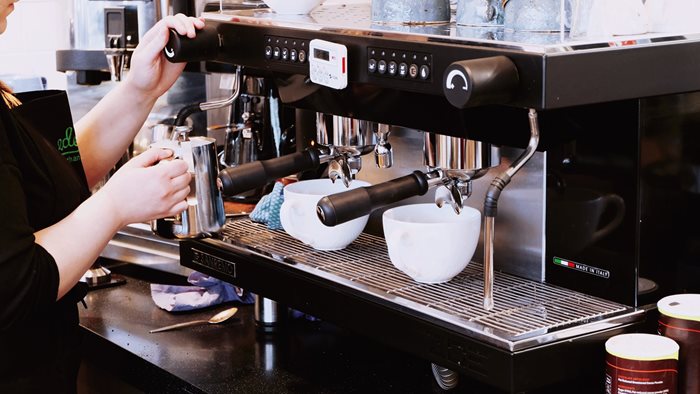Coffee shops must play to their strengths, understand their customers’ needs and embrace automation to stay competitive in an increasingly challenging trading environment, says Kamal Bengougam

“A barista can make around 20 coffees per hour, but as labour costs rise, they will need to make even more to keep an outlet profitable” – Kamal Bengougam, Coffee Consultant | Photo credit: Daryan Shamkhali
What is the new normal for the coffee industry?
People were stuck at home during the pandemic, and many have continued work and consumption patterns forged during lockdowns. Many workers have not returned to offices and people are socialising more in their own neighbourhoods, resulting in packed cafés in those locations, whereas the many city centres have yet to recover footfall.
The pandemic had a significant impact on the coffee industry as consumers began drinking more coffee at home. The initial belief was that things would return to normal after the pandemic’s harshest restrictions lifted – but that has not materialised.
This shift in consumption behaviour resulted in people investing more in premium at-home coffee equipment, which is good news from the manufacturer’s standpoint. However, as consumer knowledge of coffee has increased, equipment has improved and B2B manufacturers have developed household models, the role of the coffee shop is no longer so central when it comes to enjoying high-quality coffee.
Consumers are becoming more knowledgeable about coffee and will complain if quality is not up to scratch. Coffee shops facing the challenge of adapting to changing consumer preferences could explore upgrading to automated equipment to speed up service and increase profitability.
Operators must focus on their strengths
Coffee shops face decreased revenue due to inflation, rising rents, and labour costs. To stay afloat, owners must reduce costs and increase turnover without raising prices to retain customers.
People visit coffee shops for different reasons, and it is crucial for business owners to understand what draws customers to their cafés. Depending on the operator, coffee quality may not even rank in the top three reasons. If people visit a coffee shop because it has a great view of the sea, it makes sense to spend less money on a coffee machine and more on comfortable chairs so they can enjoy the view.
Businesses must focus on their unique selling points and make educated decisions based on researched facts to survive in this landscape. At no time in the last 20 years has it been more vital to address this. However, many coffee shop owners seem blind to this reality and are not adjusting to the current narrative.
Hospitality should embrace automation
Super-automatic machines weren’t originally built for making good coffee – they were built for delivering convenience and speed of service.
However, times have changed. Eversys was one of the first companies to revolutionise the industry by offering super-automated machines that could make coffee as good as traditional machines, with improved consistency and reduced labour costs.
The industry must accept this evolution. Manufacturers must also keep improving equipment design to break the myth that traditional machines make better coffee.
As the quality of super-automated machines improves, the difference between traditional and automatic machines will become a matter of perception and prejudice.
People only occasionally want to have an experience in a coffee shop; they just want to take their coffee to-go and not wait. There is also the need to constantly clean the equipment and stations, which is avoided in an automated set up.
“The difference between traditional and automatic machines will become a matter of perception and prejudice”
A barista can make around 20 coffees per hour, but as labour costs rise, they will need to make even more to keep an outlet profitable. Upgrading equipment to include automated solutions can speed up service.
The ideal coffee shop of tomorrow would cater to two different experiences. You walk in, turn right, and have a robot taking your order and making your coffee to go. If you turn left, you can sit down and be served.
I was recently asked on a panel discussion if I thought baristas would become obsolete due to the advent of automation. Being a barista is not a career; it’s a transient job and automation is not destroying a profession.
Operators must look at their businesses objectively and adapt to the advent of automation if they want to succeed in this new business landscape.
This article was first published in Issue 14 of 5THWAVE magazine.
Subscribe to 5THWAVE to receive each edition in print and digitally or sign up to our newsletter and be the first to read the latest articles and updates on World Coffee Portal research.
.png.aspx?lang=en-GB&width=700&height=180)